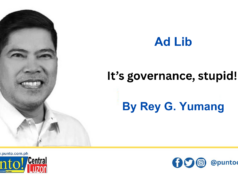IS THE Filipino a bobotante?
With the kind of elected public officials running the affairs of our country today, and with the gamut of problems we continue to face every single day, I would perfectly understand if many of you would respond quickly with a resounding “YES!” to my question.
I had a chance encounter with a former student last week when our conversation turned to his plan of migrating to another country. In a totally unexpected serious tone, he told me how he and his wife were worried about their family’s future in the Philippines. Both have stable jobs and are doing extremely well in their fields; but at the same time, the worsening state of corruption and inefficiency in government compel them to rethink about staying here or trying their luck in another country and hopefully, live a more comfortable life.
As if in utter frustration, he punctuated his statement with these remarks: “Ot enala kasi mebyasang bobotu reng Pilipino!”
This is the reason why I have always refrained from calling the Filipino voters “bobo.” Why? The majority of Filipinos who make uniformed choices are the very same political base that our leaders have exploited, whose mentality they have long understood and mastered so much so they continue to give them what satisfies them albeit temporarily. They have long become the victims of our politicians’ multi-faceted schemes.
One look at the billboards, television ads and other campaign materials flooding the social media is all it takes to realize that politicians masterfully create an image or a persona that will sit well with the Filipino masses. The end result is political idolatry.
In a nutshell, political idolatry is the elevation of political leaders, figures, or even parties that overshadow their true merits or shortcomings, often leading to blind loyalty or support. This happens when supporters show an excessive or unquestioning devotion on these political figures that is more often than not, on the image or persona, rather than their actual performance, policies, or achievements.
This is not surprising at all in our country where elections now resemble popularity contests, with image and charisma overshadowing a candidate’s real track record. In fact, in the face of serious controversies and well-documented corruption issues, many Filipino voters would stick it out with their “idols” and would remain steadfast in the support. This is so because politicians have effectively and cunningly built an image that feeds on the hopes, dreams and even frustration of their political base.
Like any other form of idolatry, this is dangerous.
For one, it distorts rational decision-making, causing voters to make choices based on emotions or superficial appeals rather than objective evaluations of a leader’s qualifications and track record.
It also keeps voters from critically evaluating a candidate’s ability to lead. Instead of considering their accomplishments or lack thereof, voters become loyal to the character projected by billboards and political ads, dismissing any contradictory facts. If the voter’s choice for leaders is merely based on surface appeal rather than merit, it should not be surprising at all that we remain vulnerable to the continuing rise of poorly qualified leaders.
So, the next time you are tempted to brand your neighbor a bobotante take some time to listen, and then guide and teach them how to look past the image and demand transparency, accountability, and a true track record of service from those seeking power. Definitely a lot easier said than done, right? But continuing to call them bobotante would not achieve anything and only alienate them further; we might as well become an instrument of their education as voters.





